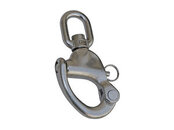You need to actually drop your weights to make sure you can actually do it.
I discovered, for example that my weight harness pockets weren't ditchable due to a manufacturing defect that I hadn't noticed until I tried to ditch them.
How is dropping them any different from just taking them out of the pockets? I mean, I practiced removing them from my body. Letting go doesn't seem any different.
Flots can correct me if I am wrong, but I assume you are talking about two different weight dropping systems. I believe he is talking about a system in which the weights are supposed to drop out of the bottom of pockets on their own when the device holding them in place is removed. It would be a good idea to test such a system to see if it actually works. In contrast, you are talking about a system in which you physically pull the weights out and hold them in your hand. Once you have them in your hand, there is no need to test the ability to let go of them.





